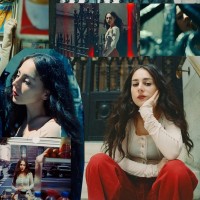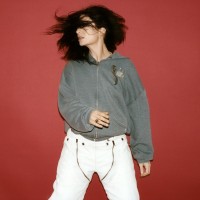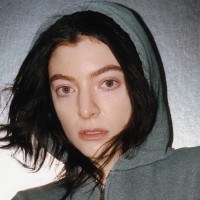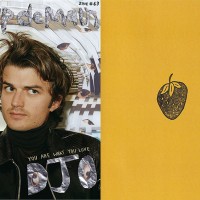Interview: Marika Hackman on her debut album, 'We Slept At Last'.
Interview: Marika Hackman on her debut album, 'We Slept At Last'.
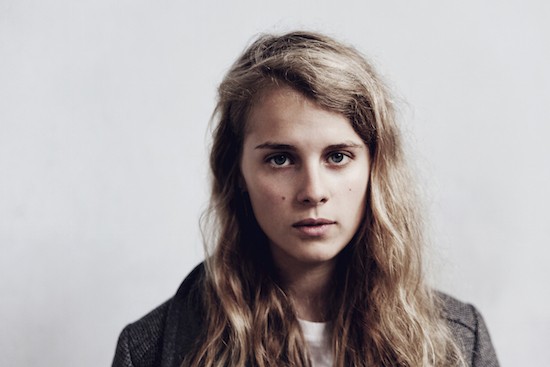
The body is present in all stages on Marika Hackman’s EPs and her debut album, 'We Slept At Last', which arrived in February of this year. It’s decaying, it’s drowning, it’s drifting in and out of consciousness. The corporeal form is Hackman’s canvas for a variety of emotions and experiences. Every feeling is expressed through pupils, waterlogged bodies, and even impulses towards cannibalism.
Hackman wields the guitar more as a weapon than as a floaty folk tool, and accompanies medieval melodies with hair-raising lyrics. Instead of simply ignoring the stereotypes placed upon women singer-songwriters, Hackman openly defies them by delving into the murky waters of death, destruction, and violence with unsettling poetry.
‘We Slept At Last’ is a collection of poems about love and fear - and particularly, the intersection between the two. With amazing collaborators and cohorts like Alt-J, The Japanese House, and Sivu, Hackman is well positioned to make a serious impact on British indie music in the years to come.
“I want the images to be very strong and not just kind of float around in the background. I want you to be hit with this hard imagery that people will understand immediately.”

COUP DE MAIN: Congrats on finishing up the U.S. tour with Laura Marling! What was your favourite part of the tour?
MARIKA HACKMAN: That’s so hard! It was one of my favourite tours that I’ve done, because it was like being on the road with a load of friends. It was a bit of a luxury for me, and playing shows in America was obviously an amazing experience. I think Chicago was the best show for me. For some reason, everything sort of clicked that night in the crowd. It was just amazing.
CDM: Do you notice differences in audiences based on where you’re performing?
MARIKA: I think maybe American crowds were making a little bit more noise. English crowds are very polite, which is really nice because it means they’re enjoying your set. But if you’re in an American crowd they go a little bit hard on the clapping.
CDM: You have worked a lot with Laura Marling in the past. You were in one of her music videos, and she was in the ‘Animal Fear’ video, where you essentially attack and eat her. Do you feel like she’s one of your mentors?
MARIKA: It’s quite funny, because obviously she thinks it’s great that everyone keeps calling her my mentor! But I find it really interesting because we’re just great friends, really. She’s been around the industry a long time and has a lot of wisdom to offer. Generally, we just hang out like normal buddies would and there’s not really a mentor/mentee kind of vibe. But we both find it funny and make lots of jokes about it.
CDM: You’ve talked a lot about genre and the perception of women in music. Genre can be a really limiting factor for women and you’ve said that there is sometimes an impulse to peg your work as ‘twee folk music’ when there are actually a lot of dark and complex themes going on. Laura Marling has also commented on this. Why do you think there’s an impulse to put you and her and a lot of other women in that box?
MARIKA: I don’t know! People still have that idea of a girl and a guitar - if she’s not singing pop songs, she’s going to be a folky princess. Just because you’re a solo artist playing guitar, that doesn’t make it folk. People get a bit confused about these things. There’s so many more aspects to my music than that. Earlier on in my career, people tried to push me in that direction. They kind of wanted me to be a folky princess, which was just never gonna happen. I don’t understand quite why it is, but it is very irritating that it’s still happening.
CDM: You meditate a lot on the human body in your songs, and also in your video. You feature stuff like cannibalism and death and darker themes, such as the ‘Drown’ video. Why do you think you’re drawn to talk about that?
MARIKA: I think with aspects of the body like blood and bones and lungs and all that stuff, it’s just because it’s universal stuff. It comes across as gory because we associate those things with being gory, but actually they’re things that everyone can relate to. They create very strong imagery. That’s something I like to do when I’m writing - I want the images to be very strong and not just kind of float around in the background. I want you to be hit with this hard imagery that people will understand immediately. I remember when I was working with Glen [Erler], who did the photography for the album, we talked a lot about life and directed that back into the photos. It was a theme that kept coming up. Everyone dies, and that’s a theme that sort of connects us all. Fears around that, and the acceptance of it, all that stuff - people don’t really touch those things. They’re a little bit scared of confronting people with darker issues, but I think it’s good for people.

CDM: Songs like ‘Ophelia’ and ‘Claude’s Girl’ are inspired by great works of Western art, and ‘Before I Sleep’ references a line of Robert Frost poetry. Were these things you grew up reading? How did you end up drawing inspiration from them?
MARIKA: When I was growing up, reading was a huge part of our lives. Before we could read, our parents would always read to us. Two stories a day - one in the morning and one in the evening. When we grew up, I was always a big reader and did it after school. I learned Robert Frost poetry through studying it, I was 14 or 15 and really loved it, particularly the line that I used. So it was sort of through studying it and they became inspirations along the way.
CDM: What kind of stories did your parents read you growing up? Was any of it classical literature?
MARIKA: Well when we were really little, it was kids’ stories. Mum used to read us lots of poetry and had a lot of poetry books. Some of it could be pretty dark.
CDM: Do you share your work with your parents before you take it to a producer? At what stage do you get family and friends involved?
MARIKA: Yeah, definitely. Both of my parents really want to hear what I’m up to so I like to keep them involved with my life anyway. They’re very interested, and when I cut a track I show it to my parents before anyone else because I know they really want to hear it.
CDM: One of my favourite songs ever is ‘Retina Television’, which features on 'That Iron Taste' EP. It has such cool percussive elements and melody, but the meaning is kind of enigmatic. What was the inspiration for it?
MARIKA: That was the first ‘love song’ that I wrote when I was about 18. It’s just talking about the other person and the fears we shared in common - the dark, spiders. Also their pupils were always really dilated, so that got on there as well. It’s just a strange, twisted love song.
CDM: The background noise is so interesting. What instruments did you use for it?
MARIKA: No instruments whatsoever. We decided to do it a capella, so all the percussion sounds are me hitting my chest, my stomach, jumping up and down, my fingernails, that sort of thing.
CDM: You decided to do all new songs for ‘We Slept At Last’ instead of including songs from your EPs. Do you feel like the inspiration for this album is connected to the EPs and songs like ‘Bath Is Black’?
MARIKA: I feel like the inspiration is that I’ve managed to change my songwriting over the past couple of years and also production styles. I could get a sense of what really worked well, and I think this sound developed naturally. That’s what happens when you’re doing it all the time and changing as a person. Some songs were really dark, and others were more psychedelic. It was useful to have that to figure out exactly what I wanted to do.

CDM: Do you have any plans for another tour out of the UK?
MARIKA: Not at the moment. I would love to, but I plan on focusing on the second record. I’m at home doing a lot of writing and figuring out what we’re going to do with it. But you never say never, because something always pops it.
CDM: And lastly, a quick-fire round... If your album 'We Slept At Last' was a type of candy, what type of candy would it be?
MARIKA: I think it would be a very high percentage chocolate bar. A really dark, cocoa-y chocolate bar - thin and bitter.
CDM: If 'We Slept At Last' was a colour, what colour would it be?
MARIKA: I think blue is the colour I associate with it because it’s the album cover, but I also think it works quite well with the album. There are a lot of water references in it.
CDM: If 'We Slept At Last’ was an animal, which animal would it be?
MARIKA: The first thing that came to my mind, which might be completely wrong, is an elephant. So I’m going to say an elephant.
Marika Hackman’s debut album ‘We Slept At Last’ is out now - click here to purchase it via iTunes.
Watch the 'Ophelia' music video below…









